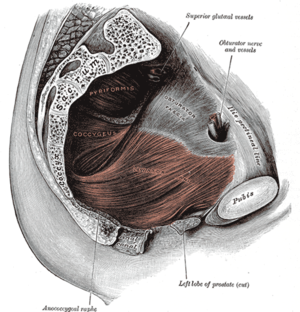Stress urinary incontinence
| Stress incontinence | |
|---|---|
 |
|
| Pelvic floor | |
| Classification and external resources | |
| Specialty | urology |
| ICD-10 | N39.3 |
| ICD-9-CM | 625.6788.32 |
| DiseasesDB | 12550 |
| MedlinePlus | 000891 |
| MeSH | D014550 |
Stress incontinence, also known as stress urinary incontinence (SUI) or effort incontinence is a form of urinary incontinence. It is due to insufficient strength of the closure of the bladder.
It is the loss of small amounts of urine associated with coughing, laughing, sneezing, exercising or other movements that increase intra-abdominal pressure and thus increase pressure on the bladder. The urethra is supported by fascia of the pelvic floor. If this support is insufficient, the urethra can move downward at times of increased abdominal pressure, allowing urine to pass.
Most lab results such as urine analysis, cystometry and postvoid residual volume are normal.
Some sources distinguish between urethral hypermobility and intrinsic sphincter deficiency. The latter is more rare, and requires different surgical approaches.
Stress incontinence is rare in men. The most common cause is as a post-surgical complication following a prostatectomy.
In women, physical changes resulting from pregnancy, childbirth, and menopause often contribute to stress incontinence. Stress incontinence can worsen during the week before the menstrual period. At that time, lowered estrogen levels may lead to lower muscular pressure around the urethra, increasing chances of leakage. The incidence of stress incontinence increases following menopause, similarly because of lowered estrogen levels. In female high-level athletes, effort incontinence occurs in all sports involving abrupt repeated increases in intra-abdominal pressure that may exceed perineal floor resistance.
In addition to weight loss and exercise there are some behavioral changes that can improve stress incontinence. First decrease the amount of liquid that you are ingesting, and avoid drinking caffeinated beverages because they irritate the bladder. Spicy foods, carbonated beverages, alcohol and citrus also irritate the bladder and should be avoided. Quitting smoking can also improve stress incontinence because smoking irritates the bladder and can make you cough (putting stress on the bladder).
Weight loss in overweight women reduced stress incontinence, in women with a Body Mass Index (BMI) over 25 and at least 10 episodes of urinary incontinence per week. With exercise and restricted diet they had a 70% or greater reduction in overall incontinence episodes.
...
Wikipedia
